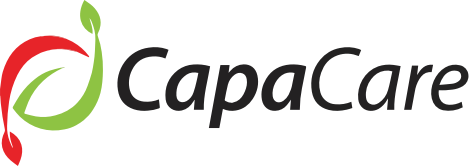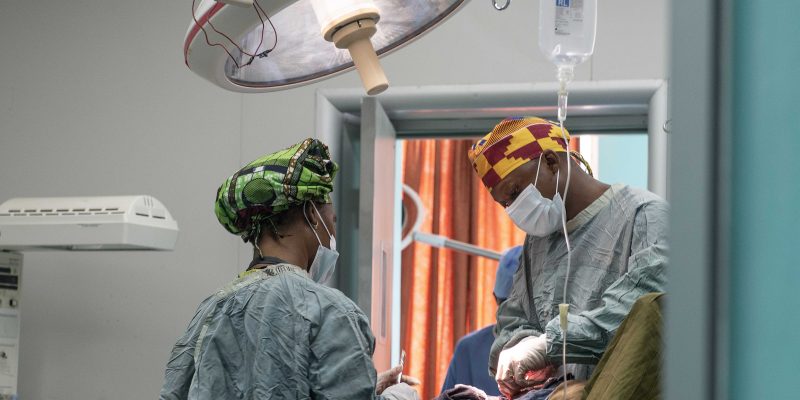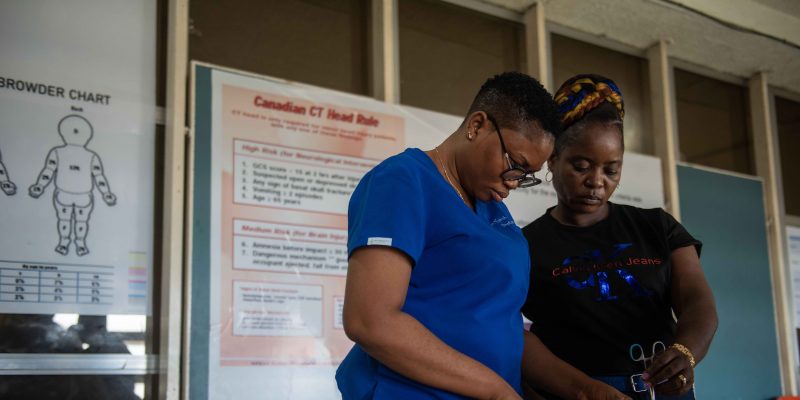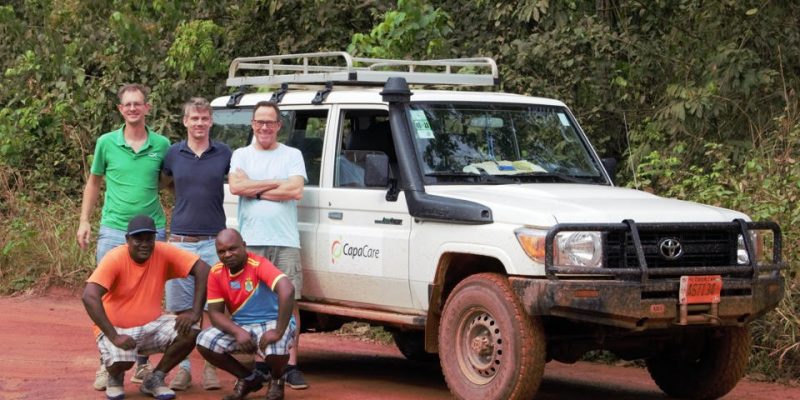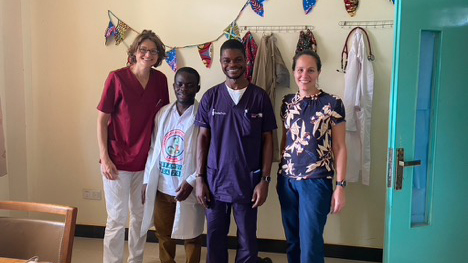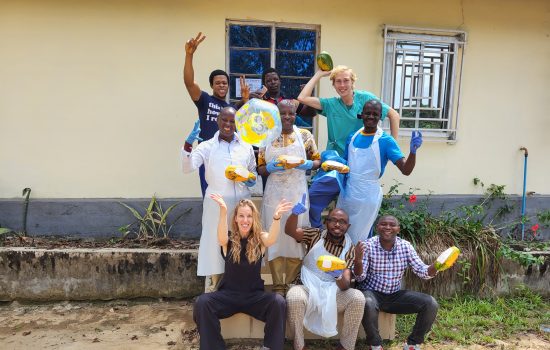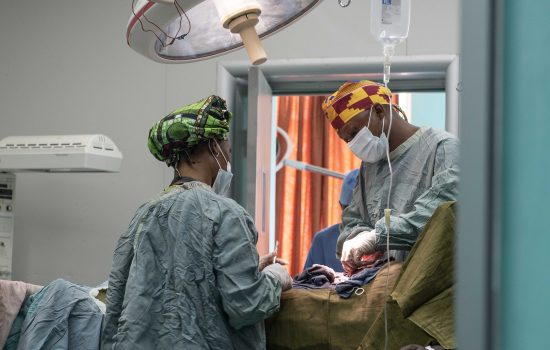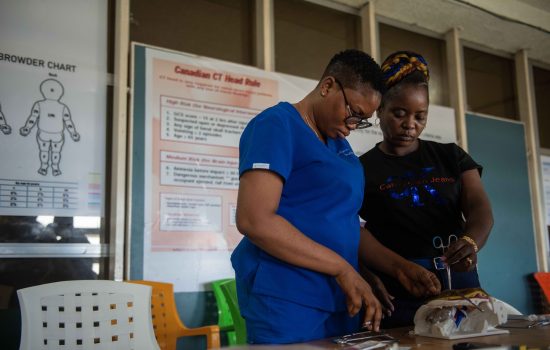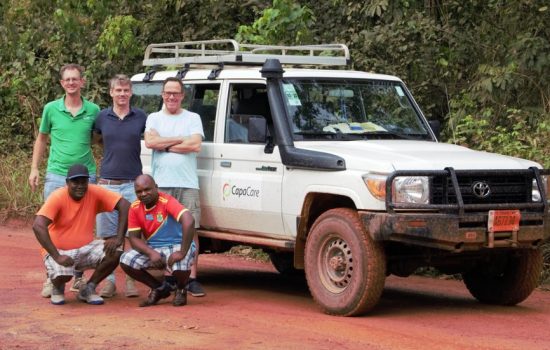CapaCare enrolled its first two students into the Surgical Training Programme in January 2011, it was Amara Conteh and Emmanuel Tommy. This was the start of CapaCare providing training in life-saving surgical and obstetric skills. Now ten years later we speak with Amara and Emmanuel, the two now very experienced Surgical Community Health Officers (SCHOs), about the impact of the Surgical Training Programme in Sierra Leone and in their own lives.

Emmanuel Tommy
What have been your roles in CapaCare and how are you contributing to the programme nowadays?
Emmanuel: Amara and I were the first two students of the CapaCare programme. Nowadays I am still working as a SCHO in Kenema District, at the regional referral hospital in Kenema city. Students from the programme come to my hospital for rotations. When the students are here, I let them do as much clinical and surgical work as possible. This is not always easy to realise since it is always very busy in the hospital and mentoring students in a proper way takes time.
Amara: I came back to Masanga Hospital in 2018 to work for CapaCare. Here I am doing clinical work and I am mentoring the new STP-students of the programme. This includes lecturing, bed side teaching, doing ward rounds together and supervision in the operating theatre. While most international trainers are here ony for a couple of weeks, I can monitor the progression of the new STP-students over a longer period.

Amara Conteh
Amara, what made you decide to go back to Masanga and work there?
Amara: First I was working in Marburka. The then Programme Coordinator Daniel visited me a couple of times there and tried to convince me to come to Masanga. They needed someone who could guide the students through the first couple of months of the programme. The students find it sometimes easier to discuss their questions or concerns with me then with the Programme Coordinator, because I am standing closer to them.

Amara Conteh teaching the STP-students
How have you seen the programme grow over the last 10 years?
Emmanuel: Since CapaCare started the training in 2011 it has not been easy. It was the first type of training related to surgery in the country. For the Ministry of Sanitation and Health (MoHS) it was strange that people other than doctors were performing surgeries. But our mission was to help our people. The services of surgery were not very adequate, especially not in the rural areas. Because of this programme, there are now many SACHOs providing surgical care all over the country. People started to have faith in the surgical care that we provide. This is very important, because patients come to you when they are in desperate need of help and are very vulnerable. Also, the doctors now see and acknowledge what my colleagues and I have done over the years. We see the doctors as our supervisors and most of them they give us the support we need.

Emmanuel at the Graduation Ceremony
How has CapaCare impacted your life?
Amara: The positive impact of CapaCare in my life is that I am now able to provide surgical care that needs expertise. The work I am doing now is way more interesting to me than what I did when I was a Community Health Officer. When people come to the hospital with their problems, I am now able to send them home healthy and happy.
What are the elements of CapaCare that you are proud of?
Emmanuel: I am very proud of the work of the whole CapaCare team, both national and international team members. When they did a survey of surgical related conditions, they realised that there is a major lack of surgical care in Sierra Leone. It is very important that some European doctors thought and cared about us. They wanted to ensure quality health care for everybody. They thought that task sharing could increase the number of surgical providers. As said, the first 10 years of CapaCare have not been easy, but look at us now, we have grown so much! The organisation gets a lot of credits, people talk about it a lot. Therefore, I am proud to be part of CapaCare.
Amara: The programme has done a lot in our country. It improved the health care system in Sierra Leone. First there were not many people who were able to provide surgical care, but now CapaCare is here the surgical capacity is extending massively. The programme also contributes to better maternal care in the country. Although the maternal death rate is not reduced to almost zero, there has been a serious decline in maternal deaths.
How do you see the future of CapaCare?
Emmanuel: There are bright sides, but I also have my concerns about the future. Recognition is one of the biggest problems for us nowadays. Since I have graduated, the role of SACHO still has not been upgraded. It is still some kind of voluntary service. That is sometimes demotivating me. We are expecting the Ministry to recognise us and place us where we belong. I appreciate the work of CapaCare, they have been pushing hard but they cannot dictate to the MoHS. It is now to the Ministry to set things up for us. All over Africa our fellow health care workers are going or have gone through the same struggle and we are hoping that there will be support for CapaCare soon.
Amara: I think the future is good because CapaCare is already expanding the programme. The recent collaboration with the School of Makeni is one of the signs that CapaCare is growing. We are now working together with the School of Makeni to find students that are interested to take part in the programme. This collaboration is an important step for the recognition of CapaCare, as the School of Makeni is closely related to the MoHS and is on the Medical and Dental Council. For me it is important that the SACHOs also will be on the Medical Council. It would be a great achievement if can get CapaCare this organised.

Amara and Jonathan vas Nunes in the operating theatre
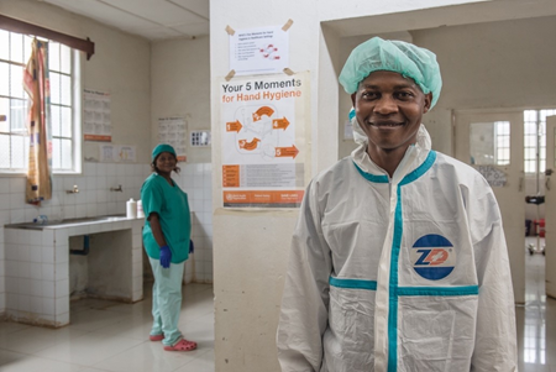
Emmanuel at Kenema Governmental Hospital
